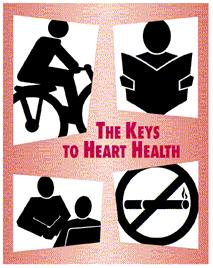The Keys to Heart Health

Your Heart
The human heart is a remarkable organ that continuously pumps blood to nourish and provide energy to the body. As big as a fist, this powerful muscle uses its own electrical system to pump blood. It pumps 5 to 6 quarts of blood a minute during rest, but more than 20 quarts a minute during exercise.
Normally, the heart automatically adjusts to changing demands. As the body needs more nourishment and energy (for example, when climbing stairs), the heart responds. It should beat faster and more forcefully, causing more blood to circulate through the body. The blood will carry more oxygen and nourishment to muscles and organs and then return to the heart to begin the process again.
Heart Failure
When a person has heart failure, the heart is weak and its pumping power is reduced. Although it still beats normally, the heart cannot pump as much blood with each beat.
| Key |
What You Can Do |
|---|
| Exercise: |
Do regular physical activity that is tailored to your abilities, needs, and interests. |
| Education: |
Learn about your heart problem, its causes and treatments, and how you can manage it. |
| Counseling: |
Get advice on why and how to change your lifestyle to lower your risk of further heart problems. |
| Behavior Change: |
Learn specific skills to enable you to stop unhealthy behaviors such as smoking or to begin healthy behaviors such as eating a heart-healthy diet. |
Proceed to Next Section

